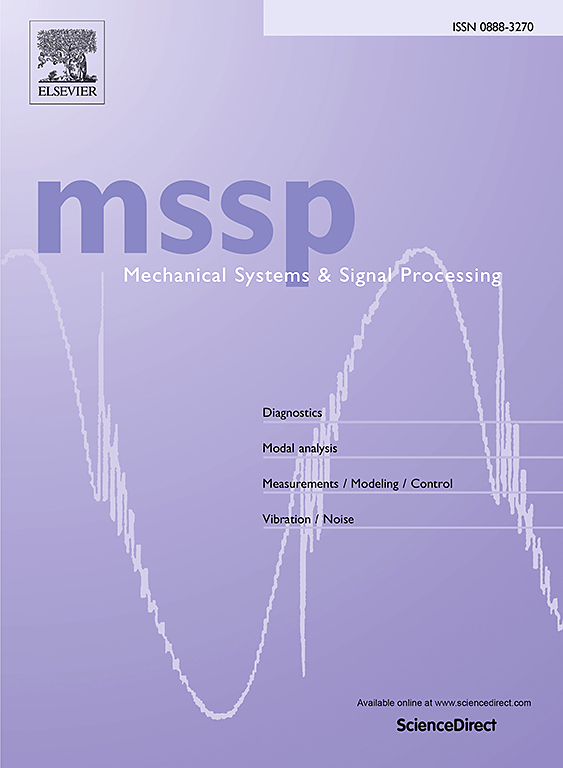Enhanced delayed resonator for complete single- and multiple-frequency vibration suppression: A hybrid feedforward-feedback control approach
IF 8.9
1区 工程技术
Q1 ENGINEERING, MECHANICAL
引用次数: 0
Abstract
Delayed resonator (DR) is an active vibration absorber capable of achieving complete vibration suppression at a specific frequency by distinctively incorporating appropriate time delays into the control loop. Existing works drive the DR mainly following the absorber-based feedback control laws. Alternatively, we here propose a hybrid control law that integrates both feedforward and feedback control, in which the feedforward control is based on excitation and the feedback one is based on the states of the primary structure instead of the absorber. A resulting key benefit is that system stability analysis can be significantly simplified thanks to the decoupling between the control parameters to be tuned and the characteristic equation. In addition to this, enhanced control performance over classical DRs is achieved in both cases of single- and multiple-frequency vibration suppression. Results show that the hybrid control law can extend the operable frequency band, expedite setting the transient process, and extend the antiresonance valley to suppress residual vibrations in steady states. Particularly, the alleviated stability issues in the multiple-frequency case allow the hybrid control law to fully leverage the strength of the delayed control in raising system order so that a single-mass absorber can yield multiple zero antiresonance points at multiple given frequencies. This work establishes a basic design and analysis framework for applying feedforward control to the DR and combining it with feedback control strategies to maximize control performance.
用于完全单频和多频振动抑制的增强型延迟谐振器:一种混合前馈-反馈控制方法
延迟谐振器(DR)是一种主动吸振器,通过在控制回路中独特地加入适当的时间延迟,能够在特定频率下实现完全的振动抑制。现有工作主要遵循基于吸收器的反馈控制律来驱动DR。或者,我们在这里提出了一种前馈和反馈控制相结合的混合控制律,其中前馈控制基于激励,反馈控制基于初级结构的状态,而不是基于吸收器。由此产生的一个关键好处是,由于待调的控制参数与特征方程之间的解耦,系统稳定性分析可以大大简化。除此之外,在单频和多频振动抑制的情况下,该系统的控制性能都优于经典DRs。结果表明,该混合控制律可以延长工作频带,加快瞬态过程的设定,并延长抗共振谷以抑制稳态残余振动。特别是,在多频率情况下,稳定性问题得到缓解,使得混合控制律能够充分利用延迟控制的强度来提高系统阶数,从而使单质量吸收器能够在多个给定频率下产生多个零反谐振点。本文建立了一个基本的设计和分析框架,用于将前馈控制应用于DR,并将其与反馈控制策略相结合,以最大化控制性能。
本文章由计算机程序翻译,如有差异,请以英文原文为准。
求助全文
约1分钟内获得全文
求助全文
来源期刊

Mechanical Systems and Signal Processing
工程技术-工程:机械
CiteScore
14.80
自引率
13.10%
发文量
1183
审稿时长
5.4 months
期刊介绍:
Journal Name: Mechanical Systems and Signal Processing (MSSP)
Interdisciplinary Focus:
Mechanical, Aerospace, and Civil Engineering
Purpose:Reporting scientific advancements of the highest quality
Arising from new techniques in sensing, instrumentation, signal processing, modelling, and control of dynamic systems
 求助内容:
求助内容: 应助结果提醒方式:
应助结果提醒方式:


